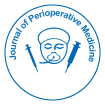
Journal of Perioperative Medicine
Open Access
ISSN: 2684-1290

ISSN: 2684-1290
Commentary - (2024)Volume 7, Issue 5
Pre-operative medical care is a key component of the surgical process that plays an important role in ensuring patient safety, minimizing surgical risks and promoting faster recovery. The period before surgery is essential for both the patient and healthcare providers, as it is the time when detailed assessments, preparations and interventions can be made to optimize health outcomes. Pre-operative care is not a one-size-fits-all protocol but involves individualized plans adapted to a patient’s medical condition, type of surgery and potential risks.
Patient assessment
The keystone of pre-operative care is the complete assessment of the patient’s medical history, physical condition and current health status. This evaluation often begins with a thorough review of the patient’s medical history, including any primary medical conditions such as diabetes, hypertension, heart disease, respiratory disorders or kidney problems. The presence of these conditions can significantly impact surgical outcomes and may need additional precautions or modifications in the surgical approach. The pre-operative medical assessment includes a detailed discussion of any prior surgeries, medications (both prescription and over-the-counter), allergies and lifestyle habits such as smoking and alcohol consumption. Medications like blood thinners, for instance, can increase the risk of bleeding during surgery and need to be managed carefully. Similarly, smoking can impair lung function and delay post-operative recovery, making it important for healthcare providers to advise patients on cessation programs before surgery.
Optimizing patient health before surgery
Once the patient’s health status is fully assessed, the preoperative period becomes an opportunity to optimize health and minimize risks. For some patients, this might involve interventions to stabilize or improve existing medical conditions. For example, in a patient with poorly controlled diabetes, achieving optimal blood sugar levels before surgery can reduce the risk of infection and promote better wound healing. In patients with cardiovascular issues, optimizing blood pressure and heart function can reduce the risk of heart complications during surgery. Smoking cessation is another important preoperative intervention. Smoking not only affects lung function, making it harder for patients to breathe after anesthesia, but also impairs wound healing and increases the risk of infections. Many surgeons recommend that patients quit smoking at least several weeks before surgery to reduce these risks.
Pre-operative patient education
Pre-operative care isn’t just about preparing the body for surgery; it’s also about preparing the mind. Patient education is a key aspect of pre-operative care that empowers patients with the knowledge they need to understand the procedure, manage expectations and actively participate in their recovery. Education begins with explaining the surgical procedure itself, including what to expect before, during and after the operation. This helps controlling fear and anxiety, which can be major psychological barriers to a successful surgical experience. Patients are informed about any necessary lifestyle changes, such as fasting before surgery or stopping certain medications. They are also advised on what to bring to the hospital and how to prepare their home environment for a smooth recovery.
Pre-operative medical care is an essential part of the surgical process that plays a key role in patient safety and successful surgical outcomes. It encloses comprehensive patient assessments, optimization of health conditions, patient education, anesthesia planning and risk mitigation. By addressing these elements before surgery, healthcare providers can ensure that patients enter the operating room in the best possible condition, reducing complications and facilitating faster recoveries. Ultimately, pre-operative care saves lives, improves quality of care and contributes to the overall success of surgical interventions.
Citation: Pascal A (2024). Pre-Operative Medical Care: Ensuring Patient Safety and Optimal Surgical Outcomes. J Perioper Med.7:248.
Received: 09-Aug-2024, Manuscript No. JPME-24-34540; Editor assigned: 12-Aug-2024, Pre QC No. JPME-24-34540 (PQ); Reviewed: 26-Aug-2024, QC No. JPME-24-34540; Revised: 02-Sep-2024, Manuscript No. JPME-24-34540 (R); Published: 09-Sep-2024 , DOI: 10.35841/2684-1290.24.7.248
Copyright: © 2024 Pascal A. This is an open-access article distributed under the terms of the Creative Commons Attribution License, which permits unrestricted use, distribution, and reproduction in any medium, provided the original author and source are credited.